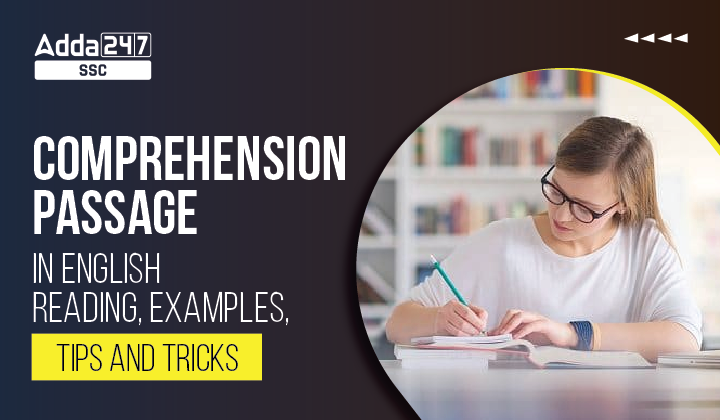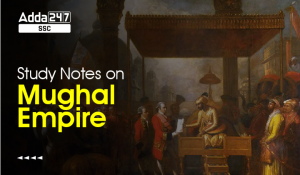Comprehension
The literal meaning of the word ‘comprehension’ is the ability of a person to understand something. This may include a piece of literature, an instruction manual, learning a new language or skill, assessing a situation for effective problem-solving and decision-making. The use of comprehension is seen across all walks of life and helps us develop as individuals and as a civilization. One of the direct uses of this ability comes across us in the English Language section of competitive exams.
Comprehension Passage
Comprehension passage is a very important section in English Language Reading Skills. In the comprehension section, an unknown and unseen passage is given on any topic, and candidates are asked to read it and understand well then questions based on it are given to solve using the facts stated therein. It checks the vocabulary, grammatical knowledge, reading skills, and observation of candidates. It is generally asked in all competitive exams to check the reading skills of the students. In this article, we are going to discuss comprehension passages in detail along with the questions and answers based on them. So read the article to understand the various aspects of solving a comprehension passage in detail.
Comprehension Passage Questions and Answers
Comprehension passage with questions and answers gives you an accurate idea about the central idea and whole meaning of the passage easily. The questions and answers are formed using the given passage and the candidates must answer all the questions concerning the given passage. It checks the language understanding level of candidates. The questions will be asked on the face and information given in the passage.
- One of the ways of utilizing the questions to one’s advantage is to read all the questions first and then going through the passage. Having an idea about what is being asked gives the reader focus on the areas of the passage that contain the answers. This helps them score well in this section of the exam.
Comprehension Passage Reading
In English, reading comprehension is a very important section and candidates can develop their reading skills through this passage. Comprehension passage reading helps students to get a quick meaning of the given passage quickly. It helps students to enhance their reading ability, grammatical understanding, and vocabulary.
This section is a combination of all the wings of a language. It is said that Abraham Lincoln built command over the English language by reading one book multiple number of times. This is a very efficient example of the capability of comprehension skills and what it can achieve.
Comprehension Passage in English
Comprehension passage in English is asked in almost every exam to check the understanding ability, vocabulary, grammatical knowledge, and observation of students. It is a part of the reading comprehension section. Preparing it well helps students to take command of the language well and enhance their vocabulary easily.
Tips & Tricks to Solve Comprehension Passages
Scoring good marks in the English Language in any exam depends on the comprehension skills of the candidates. The students should follow some useful tips to solve the passage easily. The steps are as follows:
- Read the given passage thoroughly. The reading should be quick and understandable.
- Mark the relevant details facts, and figures and underline them with a pen or a pencil.
- Read the questions carefully and back to the passage to find the answers.
- The answers are generally in a logical sequence and meaningful as per the context of the passage.
- Try to write the answers in your wording which should be easy to understand.
- To find the answers to vocabulary-based questions like synonyms, antonyms, etc., replace the word with the meaning. If you find that it is the same in meaning, the answer is correct.
- To find the correct option in Multiple Choice Questions, go through all the options well. Re-read the passage and then mark the correct option.
Comprehension Passage Example
Here we are going to discuss a comprehension passage for the ease of students to understand it and questions and answers based on it. So refer to the below passage.
Philosophy of Education is a label applied to the study of the purpose, process, nature, and ideals of education. It can be considered a branch of both philosophy and education. Education can be defined as the teaching and learning of specific skills, and the imparting of knowledge, judgment, and wisdom, and is something broader than the societal institution of education we often speak of.
Many educationalists consider it a weak and woolly field, too far removed from the practical applications of the real world to be useful. But philosophers dating back to Plato and the Ancient Greeks have given the area much thought and emphasis, and there is little doubt that their work has helped shape the practice of education over the millennia.
Plato is the earliest important educational thinker, and education is an essential element in “The Republic” (his most important work on philosophy and political theory, written around 360 B.C.). In it, he advocates some rather extreme methods: removing children from their mothers’ care and raising them as wards of the state, and differentiating children suitable to the various castes, the highest receiving the most education, so that they could act as guardians of the city and care for the less able. He believed that education should be holistic, including facts, skills, physical discipline, music, and art. Plato believed that talent and intelligence are not distributed genetically and thus are found in children born to all classes, although his proposed system of selective public education for an educated minority of the population does not follow a democratic model.
Aristotle considered human nature, habit, and reason to be equally important forces to be cultivated in education, the ultimate aim of which should be to produce good and virtuous citizens. He proposed that teachers lead their students systematically, and that repetition be used as a key tool to develop good habits, unlike Socrates’ emphasis on questioning his listeners to bring out their ideas. He emphasized the balancing of the theoretical and practical aspects of subjects taught, among which he explicitly mentions reading, writing, mathematics, music, physical education, literature, history, and a wide range of sciences, as well as play, which he also considered important.
During the Medieval period, the idea of Perennialism was first formulated by St. Thomas Aquinas in his work “De Magistro”. Perennialism holds that one should teach those things deemed to be of everlasting importance to all people everywhere, namely principles and reasoning, not just facts (which are apt to change over time), and that one should teach first about people, not machines or techniques. It was originally religious, and it was only much later that a theory of secular perennialism developed.
During the Renaissance, the French skeptic Michel de Montaigne (1533 – 1592) was one of the first to critically look at education. Unusually for his time, Montaigne was willing to question the conventional wisdom of the period, calling into question the whole edifice of the educational system, and the implicit assumption that university-educated philosophers were necessarily wiser than uneducated farm workers, for example.
Q1.What is the difference between the approaches of Socrates and Aristotle?
- Aristotle felt the need for repetition to develop good habits in students; Socrates felt that students need to be constantly questioned
- Aristotle felt the need for rote learning; Socrates emphasized dialogic learning
- There was no difference
- Aristotle emphasized the importance of paying attention to human nature; Socrates emphasized science
Ans-1. The first option is correct – their approaches were different and this difference is quite explicitly explained in the fourth paragraph
Q2.Why do educationists consider philosophy a ‘weak and woolly’ field?
- It is not practically applicable
- Its theoretical concepts are easily understood
- It is irrelevant to education
- None of the above
Ans-2. The first option is correct because educationists believe that philosophical abstractions are not suitable for practical application.
Q3.What do you understand by the term ‘Perennialism’, in the context of the given comprehension passage?
- It refers to something which is of ceaseless importance
- It refers to something quite unnecessary
- It refers to something abstract and theoretical
- It refers to something which existed in the past and no longer exists now
Ans-3. The first option is correct because the term comes from the root word ‘perennial’ – which means ceaseless.
Q4.Were Plato’s beliefs about education democratic?
- He believed that only the rich have the right to acquire an education
- Yes
- He believed that only a select few are meant to attend schools
- He believed that all pupils are not talented
Ans-4. The second option is correct – Plato’s beliefs were democratic but not his suggested practices
Q5.Why did Aquinas propose a model of education which did not lay much emphasis on facts?
- Facts are not important
- Facts do not lead to holistic education
- Facts change with the changing times
- Facts are frozen in time
Ans-5. The third option is correct – facts do change with the changing times, hence, they are not of the utmost importance when aiming for holistic education.
Que.6 According to Plato how education should be?
Ans – Plato believed that education should be holistic, including facts, skills, physical discipline, music, and art. Plato believed that talent and intelligence are not distributed genetically and thus are found in children born to all classes.



 Top 10 Longest Rivers in India, Largest ...
Top 10 Longest Rivers in India, Largest ...
 Mughal Empire Notes For RRB NTPC Exam 20...
Mughal Empire Notes For RRB NTPC Exam 20...
 Longitude and Latitude of India - Defini...
Longitude and Latitude of India - Defini...


